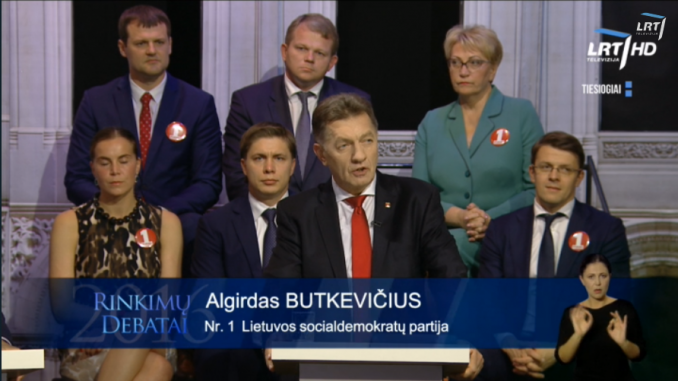
– Clash between the Chairman of the Social Democrats Algirdas Butkevičius and Homeland Union-Lithuanian Christian Democrats (TS-LKD) Chairman Gabrielius Landsbergis on the topic of poverty.
o Landsbergis pointed out a 4% increase from 18% to 22% in poverty over Butkevičius’ tenure as PM. He also noted increasing emigration rates, stating that “An entire airplane of people emigrates from Lithuania every day.”
o Butkevičius counters that poverty was caused by pension withholding done by the previous Conservative government, citing current difficulties of repaying owed pensions. Cites another €90 million needed to conclude repayment and €220 million repaid so far.
o Landsbergis notes that repayment could have been done earlier by taking a loan, given the currently favourable interest rates. Accuses coalition government of using the matter as a populist tool.
o Butkevičius responds that populism would have precisely been that sort of borrowing.
– Butkevičius cites poverty, uneven development of regions and the scale of the black market as key concerns.
– Social Democrats are intent on continuing raising the tax-free income level, primarily for those who earn under €1000. Also considering raising tax-free income levels for each child, regardless of family income. Also speak for a smart tax administration system.
– PM Butkevičius hints at potential new taxes in 2018, mentions discussions on taxing luxury property.
– Kęstutis Daukšys, speaking for the Labour Party, cites the education system, attracting investment and “assuring that people are paid wages that permit a respectable life” as key foci. Expressed support for working toward average wages of at least €1100 and minimum wages of no less than €650.
o Criticised by Saulius Skvernelis, speaking for the Lithuanian Peasant and Greens Union (LVŽS), who expresses discontent with perceived populism. Urges building such discussions on clear criteria instead of offering promisses.
– Daukšys speaks for not taxing the minimal monthly wage.
– Skvernelis critical of decision to overrule President‘s veto, but in support of a renewed labour code, albeit with the ammendments the President recommended. Mentions black market as a key economic concern.
– Skvernelis states VAT exemptions are simply populism.
– Landsbergis speaks of need to use EU funding to attract further investment, improve professional education and increase individual mobility within Lithuania. Expresses scepticism over reducing VAT.
– TS-LKD and LVŽS in agreement over matters of taxation and labour force payment system reform.
o Such reform is backed by expert recommendations according to Ingrida Šimonytė, former Finance Minister and current candidate for TS-LKD.
o Skvernelis suggests unifying the income tax, mandatory health insurance and Sodra tax into one tax at a 29% tariff, leaving only the 9% pension tariff separate. This would benefit citizens regardless of income because currently taxation ranges from 35% to 45% depending on income bracket.
– Eugenijus Gentvilas, speaking for the Liberal Movement, cites excessive taxation as the biggest obstruction for the economy. He also criticises the state monopoly in the economic sector.
– Liberal Movement speaks for equalising minimal monthly wage and tax-free income level. Also suggest to decrease Sodra tax by 1% every year, introduce a 0% income tax for businesses investing in the creation of new jobs and business expansion.
– Gentvilas also speaks for privatization of state-owned companies.

Be the first to comment